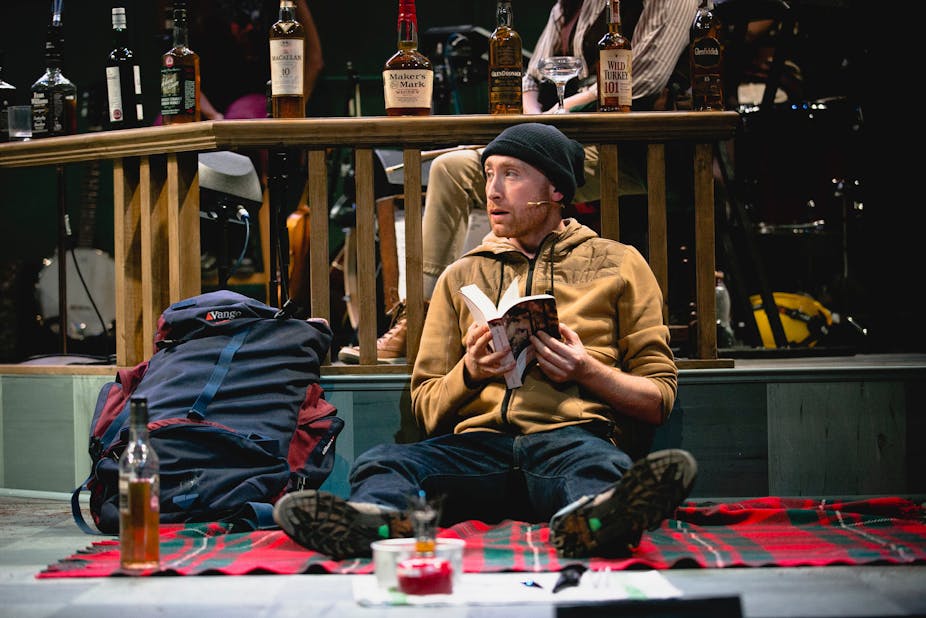What does the Scottish national identity amount to in 2016? That’s the central question in one of the most hotly anticipated shows at this year’s Edinburgh Festival, Anything That Gives Off Light. A collaboration between the Brooklyn-based TEAM ensemble and the National Theatre of Scotland, the play was originally intended to coincide with the 2014 independence referendum. With a second referendum now looking likely after the Brexit vote in June, it feels just as timely.
The plot focuses on three main characters with different perspectives on Scottish identity: Brian (Brian Ferguson), a Glaswegian living in London who has returned home to find a burial place for his granny’s ashes; Red (Jessica Almasy), a Virginian holidaying in Scotland to try and understand her estranged husband; and Iain (Sandy Grierson), Brian’s childhood friend who stayed with his mammy in Glasgow.
It opens with Brian shuffling around the stage, trying and failing to shake off London and reconnect with Scotland by walking in a “Scottish way”. It concludes with Iain driving around Glasgow, finding his Scottishness in everything from a group of Slovaks singing in three-part harmony to a girl outside a Sikh gurdwara clapping to the rhythm of an Orange March.
In between is a bawdy, mythical, emotional romp across Scottish and Appalachian landscapes on an introspective quest for self and Scottishness. It tells the story of the shift from a rural-based, tightly-knit Scottishness to a more inclusive, urban one which has more experience of dealing with migrants and outsiders.
This sense of a Scotland emerging from its dark imperial past reminded me of the sentiment in Hamish Henderson’s Freedom Come-All-Ye, sometimes described as an alternative national anthem. Yet it’s Iain, the Scot within the country, for whom this shift is more apparent than for Brian, the one who has moved away.
As the characters journey towards the Highlands, they travel not only in space but in time, and their different homelands merge. The story of an old lady about to be evicted as part of the 18th and 19th-century clearances of tenant crofters by Highland aristocrats blends into the story of a young lady whose home is threatened by environmental disaster in Appalachia in the eastern US, many of whose original settlers came from Scotland.
Brian, who works in London property, first becomes the landowner evicting the tenants during the clearances, then turns into a Scottish emigrant “made good” in latterday Appalachia and responsible for pushing people off their land. It was a perceptive comment on the circularity of life and the way different generations deal with the same issues again and again.

Stories and heritage
The play explores how stories are central to our sense of identity. We all have stories of family, community, nationhood and past successes and failures. We carry them in our journey through life and have to negotiate and recreate them during crises. As part of Scotland’s story, the play references William Wallace, Bonnie Prince Charlie and Margaret Thatcher. Meanwhile Red sings of putting stories in a bag around her neck that eventually merge into a single story that becomes too heavy to carry.
The three characters in the play hotly debate themes of Scottish heritage, putting the record straight about some things along the way. For example the common understanding of the battle of Culloden of 1746 as simply a massacre of the Scots by the English – making it a useful vehicle for Scottish nationalism – is dismissed as ignoring how Scots colluded against one another at the time.
The play also emphasises the impact of the Scottish Enlightenment on American political culture, while Walter Scott’s Waverley novels are credited with inspiring the American Civil War by generating a sense of Romantic nationalism replete with notions of identity and loyalty.

But above all, Anything That Gives Off Light is about how Scotland is perceived from the inside and outside. It is about how outsiders have not necessarily caught up with the ways in which stereotypes about parochial Scots with a Culloden-type chip on their shoulder have been superseded in the years since devolution and even the Scottish referendum.
There is much truth in this, in my view. In the Brexit referendum, it was the English who voted in fear of the effect of immigrants on their national identity while the Scots appeared more comfortable with theirs. And while Red speaks several times in the play about how Scots and Americans both view themselves as underdogs but see them as losers and survivors respectively, the confidence of the two Scots in the play seems to question this aspect of the Scottish psyche.
The play is a powerful reminder to outsiders to listen first and speak cautiously about what they think they know: culture and identity are constantly evolving, however much it might be more comforting if they stayed still.

